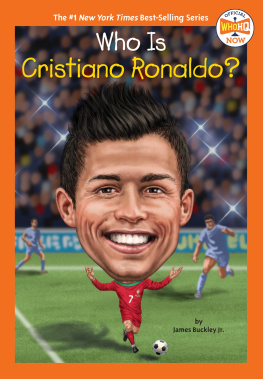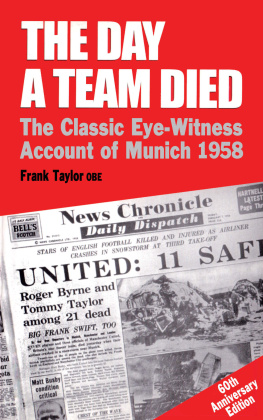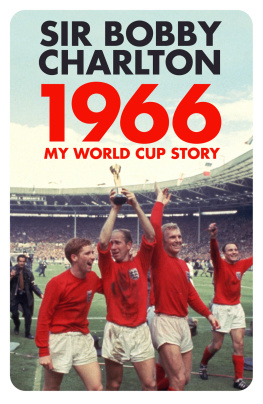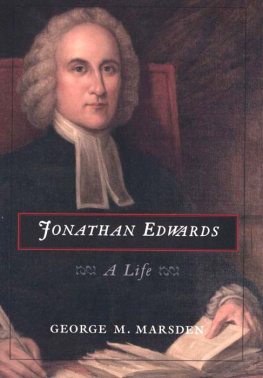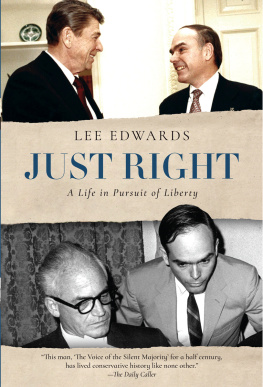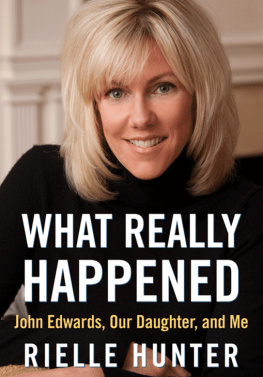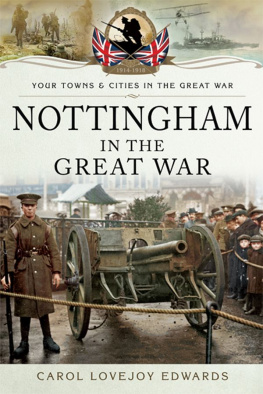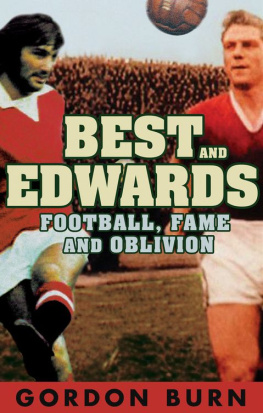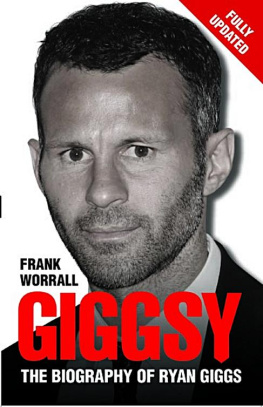DUNCAN
EDWARDS

First published in Great Britain by Simon & Schuster UK Ltd, 2012
A CBS COMPANY
Copyright James Leighton, 2012
This book is copyright under the Berne Convention
No reproduction without permission
All rights reserved.
The right of James Leighton to be identified as author of this work has been asserted by him in accordance with sections 77 and 78 of the Copyright, Designs and Patents Act, 1988.
Simon & Schuster UK Ltd
1st Floor
222 Grays Inn Road
London
WC1X 8HB
www.simonandschuster.co.uk
Simon & Schuster Australia, Sydney
Simon & Schuster India, New Delhi
Every reasonable effort has been made to contact copyright holders of material reproduced in this book. If any have inadvertently been overlooked, the publishers would be glad to hear from them and make good in future editions any errors or omissions brought to their attention.
A CIP catalogue record for this book is available from the British Library
Hardback ISBN 978-0-85720-781-4
eBook ISBN 978-0-85720-783-8
Typeset by M Rules
Printed and bound by CPI Group (UK) Ltd, Croydon, CR0 4YY
For Mum and Dad, thanks for everything
It was in the character and spirit of Duncan Edwards that I saw the true revival of British football
Walter Winterbottom England manager
INTRODUCTION
F rom as far back as I can remember, football has always been a major part of my life. In my house I didnt have much choice. My father, the beautiful games most ardent advocate, didnt start bedtime stories with Once upon a time. Instead, they usually began with: Did you know Denis Law once scored six goals in a cup tie against Luton in 1961 and the game was then abandoned because of rain? Some seven-year-olds may have found such trivia tedious, but I hung on his every word.
For hours at a time, I would be transfixed as he filled my eager young mind with tales of how a 17-year-old Pel juggled the ball over an opponents bemused head and scored in the 1958 World Cup final, or how George Best once beat his marker merely by taking his boot off. Its fair to say that he was, and is, a football fanatic and that fanaticism has rubbed off on me.
Along with my brother, godfather and cousin, we have both traipsed up and down the country watching games at all levels in our quest to capture a memory that will last a lifetime, a moment of unparalleled genius that is so great that it would have us looking at each other in wonder, with the unspoken question being: did that really just happen? On our travels we have been fortunate to have witnessed some of the games greatest players in action, as well as some of the worst; but still, we were there. We had seen players do things that we could only dream of.
Together, we were at a blistering hot White Hart Lane, on 8 September 1990, when Paul Gascoigne, buoyed by his success at the World Cup that summer, sensationally scored his first and only hat-trick in English football. Throughout the 1990s we were privileged to see the enigmatic talents of Cantona, Beckham, Giggs, Ginola, Klinsmann, Bergkamp, Rivaldo and Figo conjure up moments that will forever be ingrained in our memories. In recent years, we have been treated to the sight of Henry, Ronaldinho, Ronaldo and Messi in full flight, and we were even at the 2006 FA Cup final where we witnessed Steven Gerrard deliver a complete performance, as well as two sensational goals, to win the FA Cup for Liverpool in true Roy of the Rovers style.
On the way back from these football pilgrimages, we would sometimes be so moved by the brilliant display that we had just witnessed that our conversation would turn to that age-old question: who was the greatest footballer of all time? Though I could never make up my mind, with my suggestions ranging from Pel to Zidane, my godfather Barry would always give the same answer: Duncan Edwards. Usually we would scoff at this, but he was adamant: in his eyes Edwards was, and always will be, the greatest.
During the 1950s, my godfather had travelled by train, bus and foot to watch all of the top players of that era in action. Come rain or shine, every Saturday he would be at a match, crammed into a stand, twirling a rattle, with a rosette on his chest, intent on getting his football fix. The 1950s was a decade that produced some of English footballs most-lauded players, and as such he was fortunate to watch the likes of Sir Stanley Matthews, Billy Wright, Sir Tom Finney and John Charles when they were at their peak. But it was Duncan Edwards of Manchester United who really caught his attention.
Big, strong, quick and fit, my godfather claimed that Manchester Uniteds number six also had supreme ball control and skill, could spray passes to all corners of the field with both feet, was a tank in the tackle, was comfortable in any position and had the heart of a lion. Apparently, there was nothing that was beyond him.
As one of the famous Busby Babes, he was also an integral part of a team that won two league titles, played in an FA Cup final and twice reached the semi-final stages of the European Cup. He also held the record for being Englands youngest post-war international and this led my godfather on to the next part of his argument: but for the Munich disaster, he was certain that Edwards, and not Bobby Moore, would have captained England to World Cup glory in 1966.
We all agreed that no doubt Duncan Edwards had been a good player, but he had played only four full seasons of professional football, hardly enough for him to warrant being called the greatest player of all time. And, even if his feats were that great, the game was different then, it was slower, less technical, less demanding. No doubt he would struggle in todays fast-paced game. Most damning of all, sometimes we claimed that the memory of those who had seen Edwards play might have become clouded by sentiment due to his tragic demise.
Ignoring our protests, my godfather always stuck to his guns and in response he would throw back a quote from Sir Bobby Charlton: Who is the greatest footballer ever? The best I played with? Or played against? Its the same answer, Duncan Edwards. And remember, I played with Moore, Best and Law. And I played against Pel. In the face of such an opinion, who were we to argue?
As the years went by, and I heard more legends from the game heap praise on Duncan Edwards, I began to wonder if my godfather might not have a point. Trying to understand this mysterious legend, I watched the few flickering black-and-white images of him in action on You Tube and read some magazine articles and books on the Busby Babes. Yet nothing I read or saw truly answered my question: was Duncan Edwards really as good as people say he was?
In an attempt to get to the bottom of Edwards greatness, I decided that there was only one resource available to me that could tell his story untainted by sentiment: the newspaper reports that were written when he was still in action. Reading through hundreds of these reports was certainly an eye-opener.
Sports commentators from Edwards time were gushing with praise after almost every game that he played. Reporters used words such as majestic, phenomenon, awe inspiring, Trojan and titan to try to describe the peerless performances of Uniteds thoroughbred. In the end, no superlative seemed to do him justice. His feats were apparently equally heroic in defence and attack, and it is easy to see why he was so revered. While Manchester United fans were treated to the sight of their young star dominating Europe, England fans revelled in seeing him destroy Brazil and the world champions, West Germany. Gradually, I began to realise that the hype surrounding him was not unwarranted. Desperate to find out more, I set out to write a book on a life that had so much potential but was so cruelly cut short.
Next page

